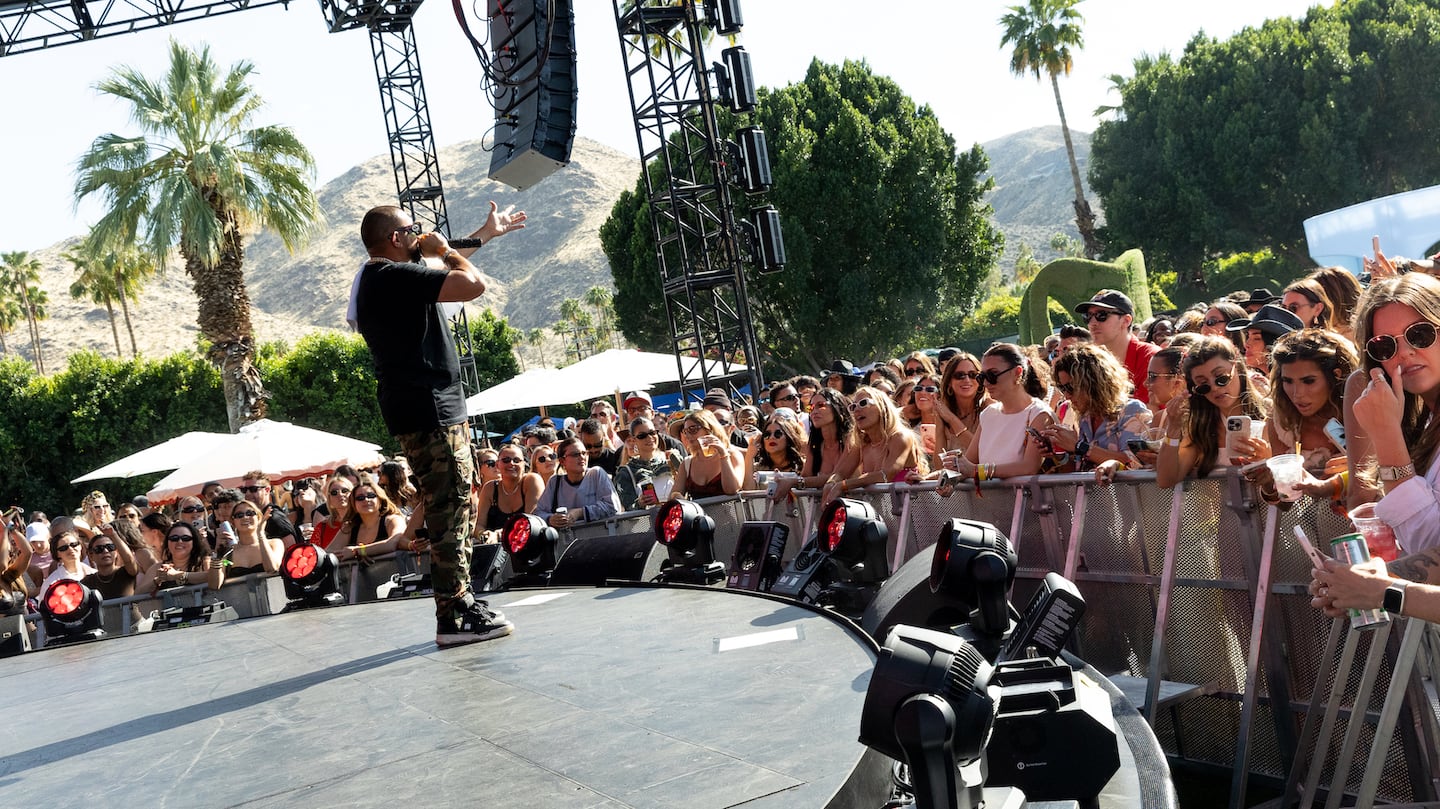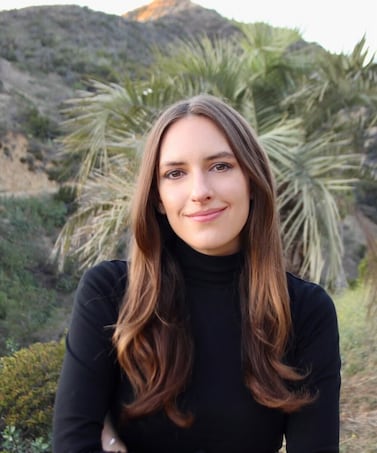
The Business of Fashion
Agenda-setting intelligence, analysis and advice for the global fashion community.

Agenda-setting intelligence, analysis and advice for the global fashion community.

PALM SPRINGS, CALIFORNIA — At one time, a photo with the Coachella ferris wheel was the most iconic Instagram status symbol to come out of the two-weekend concert. Then, the Revolve Festival carousel swing came along. The fashion e-tailer’s carnival ride became a flex that separated the influencers and A-list celebrities from the masses, signifying attendance at the invite-only event held annually on Coachella’s first Saturday.
This year, the swing was no more. Hosted on the grassy grounds of the Parker Palm Springs hotel, the Revolve Festival was noticeably smaller, and not just because it was back to a single day, from two in recent years. Known for its ability to draw attendees such as Timothée Chalamet and the Kardashians, the party’s guest count was also down to 1,200 from 5,000 at its 2022 peak.
There were still influencers clad in short shorts, tiny crop tops, see-through dresses and cowboy boots, lining up for Havaianas flip flops, Quay sunglasses and other festival-appropriate products. A photo booth dispensing the cult Peptide Lip Treatment by Hailey Bieber’s beauty brand Rhode was by far the biggest draw. A bar stocked full of 818 margaritas and vodka Red Bulls fuelled singalongs to performances of “Get Low” by the Ying Yang Twins and “What’s Your Fantasy” by Ludacris. Celebrity appearances included Bieber, who also sponsored a frozen yogurt stand that encouraged people to add the “Hailey’s Way” toppings of chocolate chips and peanut butter, as well as Megan Fox, Emma Roberts and Charli D’Amelio.
But the scaled-back event is partly a reflection of how Coachella hype has faded. And Revolve, which helped invent influencer marketing as we know it with over-the-top events like the Festival, is looking to new ways to leverage social media hype in order to sell clothes.
ADVERTISEMENT
It was becoming increasingly clear that something needed to change. Coachella parties have made headlines in recent years as much for long lines and ubiquitous advertising as the music or the looks. The influencer trip format, where social media celebrities are sent to exotic locations and exclusive events, frequently generates backlash, and worse – boredom.
Revolve’s net sales, which crossed $1 billion in 2022, dipped 3 percent last year. The 2023 Revolve Festival generated about half the earned media value – a measure of attention online – as it did in 2019, according to influencer marketing platform Creator IQ.
The company is responding by expanding its focus from festival outfits, party dresses and beachwear to everyday categories including office wear and beauty. Its marketing is also, if not exactly staid, certainly toned down from its pre-pandemic heyday. Overall marketing spend decreased from $181 million in 2022 to $171 million in 2023, according to regulatory filings. While Revolve sent influencers on a trip to the Super Bowl and to visit its pop-up store in Aspen this year, it has not yet done any of its signature #revolvearoundtheworld global brand trips.
“We do have some trips and events already planned, but I don’t know if we’re going to do as much as we did last year,” said Revolve’s chief brand officer Raissa Gerona.
Founded in 2003, Revolve hit its stride when it went all-in on influencers in the early 2010s.
It was one of the first e-tailers to hold influencer trips, generating aspirational content from luxurious locales like Dubai or Turks and Caicos. It also became synonymous with bringing that aspirational aesthetic to Coachella, sending its first group of influencers to the California desert music festival in 2013 at the height of the flower crown era. That led to the creation of the Revolve Festival in 2016, which ballooned into a full-blown separate two-day music festival that brought in performers such as Cardi B, SZA and Travis Scott over the years.
“Raissa made the whole ‘Revolve Around the World,’ and she’s a genius for that,” said Megan Levy, head of talent acquisition at influencer management agency Shine Talent Group, which has influencer clients who attended Revolve Festival. “It kicked off a whole new wave of influencer marketing.”
Sales soared, year after year. Revolve went public in 2019, earning a $1.2 billion valuation. Unlike other e-tailers that held initial public offerings around that time, its sales and profits continued to climb, with compound annual revenue growth of 22 percent since its IPO. By late 2021, its share price had more than doubled.
ADVERTISEMENT
But the first cracks in Revolve’s strategy began to appear the following year. In 2022, the first Revolve Festival since the pandemic confronted a new culture of outspoken Gen-Z TikTokers. After the festival hit capacity on its first Saturday back, disgruntled influencers took to the short-video platform to rant about being denied entrance. In 2023, Revolve reduced its festival size to 3,000 people and cut the length on both days.
Influencers at Revolve Festival on Saturday seemed happy with the more exclusive guest list and easier logistics.
“I thought it was perfect because it wasn’t overcrowded, but there were definitely a lot of people there and everyone was having a good time,” said model Marianne Fonseca, who gave out products from her body-care brand Gente Beauty to influencers in Revolve’s gifting suite this year.
Even the biggest influencer events aren’t packing the same marketing punch, and not just for Revolve. Other brands, such as the makeup line Tarte, have also faced scrutiny for their influencer trips, whether for showcasing an out-of-touch lifestyle or a lack of diversity, or both. Beyond the controversies, consumers seem to be getting bored with watching social media celebrities frolic on the beach or at Coachella. Gerona herself has said that the traditional influencer trip feels “dated” these days.
“This trend for festivals and big festival brands is similar to the emerging consensus around influencer trips: they drive [attention] for the brands in question, but there’s more negative sentiment,” said Alex Rawitz, the director of research and insights at Creator IQ.
Influencers have also been evolving past the 2010s Instagram aesthetic. Aimee Song, one of the influencers known for driving the Coachella influencer fashion boom and a regular attendee at the Revolve Festival, is no longer doing her Song of Style fashion collaboration with Revolve as she launched her own standalone luxury line last week.
Revolve is undergoing a style makeover of its own.
While its activations have often centred around event-based dressing like festivals, parties or vacations, Gerona said that influencer trips have become more focused on everyday clothing like activewear, blazers and basics. This also applies to its collaboration strategy, which is still going strong – the company just appointed Marianne Hewitt the creative director of its in-house label L’Academie, which offers suiting separates and work-appropriate clothing.
ADVERTISEMENT
Location choices have expanded from tropical hotspots to cities – last year’s destinations included Singapore, Tokyo and the Netherlands. Rather than flying American influencers to international locations, these trips are increasingly tapping local talent in a bid to grow Revolve’s international sales. The Singapore trip featured influencers from across Asia, while a Mexico trip last year brought influencers from countries across Latin America.
According to its latest earnings report, the company is also focusing on expanding high-growth categories including menswear, home and beauty, which saw a 49 percent year-over-year net sales increase in the fourth quarter last year.
“We travelled a ton in the last decade and it has been so fun, and has been obviously so important and pivotal to the brand, but now it’s also trying to think about ‘Okay, there’s so many different categories that we sell on Revolve,’” said Gerona.
The new approach has some converts. In March, TD Cowen analysts upgraded their outlook for Revolve’s stock, citing “early signs of improvement.” For growth to return to 2022 levels, Revolve “will need to execute on reaching new customers while retaining their existing Gen-Z and Millennial base as they grow older,” the analysts said.
The old Revolve isn’t going anywhere. While Song may be done with Revolve, influencer Camila Coelho was on hand at Revolve Festival in a look from her collection with the retailer.
And at Stagecoach, the country music festival held on the same site as Coachella later this month, Revolve is launching its inaugural afterparty. Some 1,000 attendees are expected, including plenty of influencers.
“Festival will always be a signature and just a part of what we do because we’ve been doing it for so long,” said Gerona.
For nearly a decade the beauty brand has built its marketing around sending social media celebrities on lavish vacations, a practice that’s become increasingly controversial. Could a trip to New York for 13 ordinary customers and their plus-ones to see Beyoncé in concert alter that perception? One reporter tagged along to find out.
The two-weekend music festival kicks off on Friday amid questions about whether it’s losing its cachet with music lovers – and its status as one of fashion’s top marketing opportunities.
Big music festivals produce a torrent of content for social media, but the fashion is equally as important, as what influencers wear to Coachella can quickly become a big seller in stores worldwide.

Liz Flora is a Beauty Correspondent at Business of Fashion. She is based in Los Angeles and covers beauty and wellness.
When done effectively, a cultural partnership can rightfully earn its own place in the zeitgeist. But it’s not so easy as just hiring a celebrity to star in an ad campaign; brands must choose a partner that makes sense, find the format that fits best and amplify that message to consumers.
Calvin Klein’s chief marketing officer Jonathan Bottomley speaks to Imran Amed about the strategy behind the brand’s buzzy Jeremy Allen White-fronted campaign.
Often left out of the picture in a youth-obsessed industry, selling to Gen-X and Baby Boomer shoppers is more important than ever as their economic power grows.
This month, BoF Careers provides essential sector insights to help PR & communications professionals decode fashion’s creative landscape.